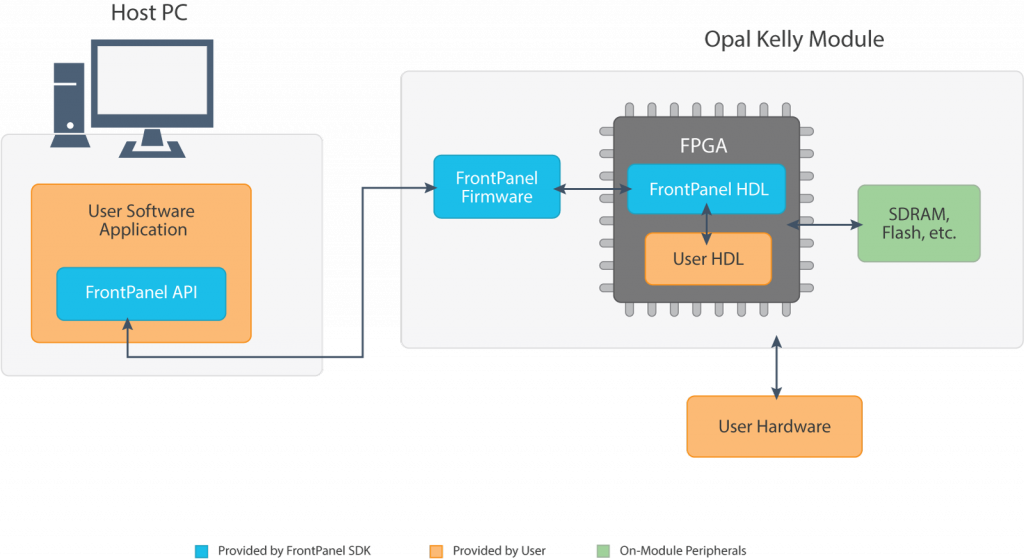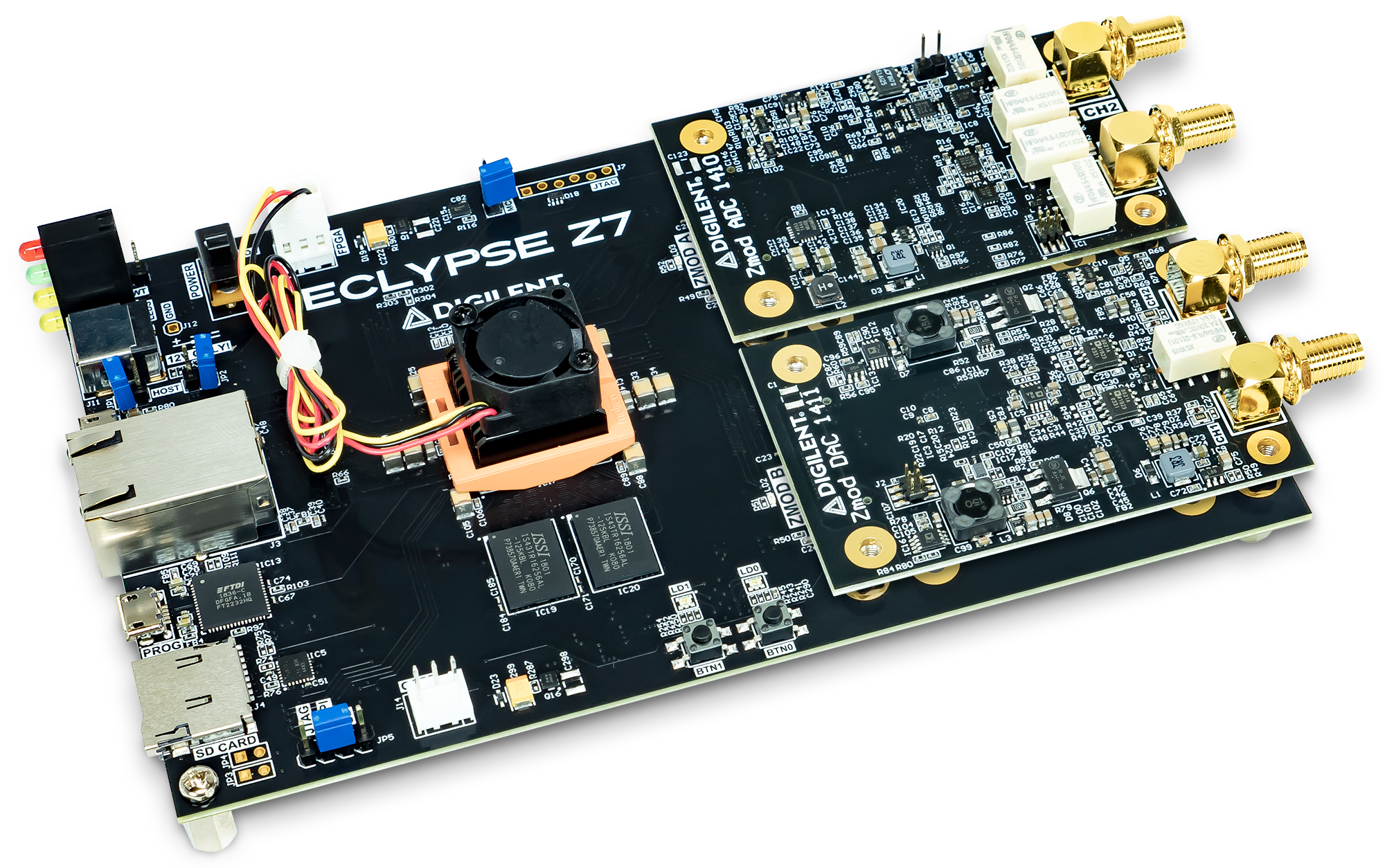Multi-Platform FrontPanel API and USB Driver. Our robust USB driver and FrontPanel API work together to provide an easy-to-use software interface to your hardware that is consistent across the Windows (32-/64-bit), Linux (32-/64-bit), and Mac OS X development environments.Our PCI Express driver is available for Windows 32-bit and 64-bit operating systems. Community discussion for Opal Kelly products and related topics. Computer does not recognize ZEM4310 (Need Driver updated Driver.?) Suggestions.
| XEM7310-A75 |
| XEM7310-A200 XC7A200T-1C, 1 GiB |
| BRK7010 |
The XEM7310 is a USB 3.0 integration module based on the highly capable Xilinx Artix-7 FPGA. In addition to a high gate-count FPGA, the XEM7310 utilizes the high transfer rate of USB 3.0 enabling speedy FPGA configuration and data transfer. With integrated SDRAM, power supplies, and platform flash, the XEM7310 is the latest addition to Opal Kelly’s most popular form-factor.
Need access to the Artix-7 gigabit transceiver (GTP)? Consider the XEM7310MT!
FrontPanel™ SDK
Opal Kelly’s FrontPanel SDK is an easy-to-use, robust API for communication, configuration, and interfacing to your PC, Mac or Linux hardware. FrontPanel handles all the interaction between your software and the FPGA internals, dramatically reducing the time and effort required to interface to a design.
Prototyping and OEM Integration
Opal Kelly FPGA integration modules are designed to be the ideal turnkey solution for prototypes and OEM product integration. With the complete FrontPanel SDK, there’s simply no faster, more reliable, production-ready way to jump start your FPGA design.
Block diagram
1 GiB DDR3
Integrated 1-GiByte DDR3 provides loads of high-speed on-board memory for high-performance applications, including image capture and data acquisition.
HIGH-EFFICIENCY POWER SUPPLIES
High-efficiency switching power supplies provide stable, dependable power to the FPGA. In most applications, there is enough extra juice to also supply your board.
SUPERSPEED USB 3.0
Measured performance at over 340 MiB/s for real-world data transfers to/from the PC.
BOOTABLE SERIAL FLASH (2x 16 MiB)

Integrated 16 MiB of on-board serial Flash for standalone FPGA booting and miscellaneous nonvolatile memory and a separate 16 MiB serial Flash for exclusive FPGA use.
Customer Deployments
- CMOS image sensor test equipment
- Radar system - test interface, system integration, field testing
- Evaluation platform for semiconductors
- Bioinformatics co-processors
- Camera interface for IR and LIDAR 3D cameras
- Equipment for analyzing satellite imagery
- Design of equipment for mineral exploration
- University research
- University classroom design projects
- Image or video capture / processing
- Data acquisition
- ASIC / hardware-based simulation and verification
- Bioinformatics (DNA search and pattern matching)
- Digital communications
- High-speed USB / FPGA co-processor
- Evaluation platform for your product
- Custom test equipment
- Cryptography
- Data Security
20111228-FP40-XEM3001v2.zip
Product Comparison

| Feature | XEM7310-A75 | XEM7010-A50 | XEM7310-A200 | XEM7010-A200 | |
|---|---|---|---|---|---|
| Interface Measured Performance | USB 3.0 SuperSpeed 340+ MiB/s | USB 2.0 HighSpeed Up to 38 MB/s | USB 3.0 SuperSpeed 340+ MiB/s | USB 2.0 HighSpeed Up to 38 MB/s | |
| FPGA Minimum Xilinx Tools Required | XC7A75T-1 Vivado WebPack | XC7A50T-1 Vivado WebPack | XC7A200T-1 Vivado WebPack | ||
| Slice Architecture | 4 6-LUT, 8 DFF | ||||
| Slices | 11,800 (94,400 DFFs) | 8,150 (65,200 DFFs) | 33,650 (269,200 DFFs) | ||
| FPGA RAM | 3,780 Kib BlockRAM 892 Kib Distributed | 2,700 Kib BlockRAM 600 Kib Distributed | 13,140 Kib BlockRAM 2,888 Kib Distributed | ||
| MULT / DSP | 180 | 120 | 740 | ||
| CMTs | 6 | 5 | 10 | ||
| On-Board DDR3 Banks, Width, Peak Bandwidth | 1,024 MiB One, x32, 25.6 Gb/s | 512 MiB One, x16, 12.8 Gb/s | 1,024 MiB One, x32, 25.6 Gb/s | 512 MiB One, x16, 12.8 Gb/s | |
| System Flash FPGA Bootable? | 128 Mib Yes | – | 128 Mib Yes | – | |
| FPGA Flash FPGA Bootable? | 128 Mib No | 32 Mib Yes | 128 Mib No | 32 Mib Yes | |
Features & Specifications
- Xilinx Artix-7 (XC7A75T-1FGG or XC7A200T-1FBG)
- 2x 16-MiB serial flash (Numonyx N25Q128A)
- 1-GiByte DDR3 (Micron MT41K256M16TW or equivalent)
- Small form-factor -- smaller than a credit card at 75mm x 50mm x 15.8mm (2.95' x 1.97' x 0.62')
- SuperSpeed USB 3.0 interface (Cypress FX3) for configuration and data transfer
- USB Type-C Connector
- Measured performance over 340 MiB/s
- Self-powered by external DC source
- Low-jitter 200 MHz clock oscillator
- Eight LEDs
- Two 80-pin 0.8mm Samtec board-to-board connectors (BSE-040)
- 126 user I/O including 4 MRCC pairs, 4 SRCC pairs, and 1 XADC pair
- Independent access to VCCO bank voltages
- JTAG pins available on the expansion connectors
- Full FrontPanel virtual control panel support
- Complete Application Programmer's Interface (API) in C, C++, C#, Ruby, Python, and Java
Library
OpenAL is a freeware software download filed under programming software and made available by Creative Labs for Windows.
The review for OpenAL has not been completed yet, but it was tested by an editor here on a PC and a list of features has been compiled; see below.
3D Audio API libraryOpenAL is a cross-platform 3D audio API appropriate for use with gaming applications and many other types of audio applications.
OpenAL, the Open Audio Library, is a joint effort to create an open, vendor-neutral, cross-platform API for interactive, primarily spatialized audio. Its primary audience is made up of application developers and desktop users that rely on portable standards like OpenGL for games and other multimedia applications.
The library models a collection of audio sources moving in a 3D space that are heard by a single listener somewhere in that space. The basic OpenAL objects are a Listener, a Source, and a Buffer. There can be a large number of Buffers, which contain audio data. Each buffer can be attached to one or more Sources, which represent points in 3D space which are emitting audio. There is always one Listener object (per audio context), which represents the position where the sources are heard -- rendering is done from the perspective of the Listener.
Features and highlights


- EAX2.0: EAX 2.0 calls
- EAX3.0: EAX 3.0 calls
- EAX4.0: EAX 4.0 calls
- EAX5.0: EAX 5.0 calls
- ALC_EXT_EFX: Effects Extension (documentation in the OpenAL SDK
- EAX_RAM: XRAM support (documentation in the OpenAL SDK
OpenAL 2.1 on 32-bit and 64-bit PCs
This download is licensed as freeware for the Windows (32-bit and 64-bit) operating system on a laptop or desktop PC from programming software without restrictions. OpenAL 2.1 is available to all software users as a free download for Windows.
Since the publisher or product no longer exists, the download of OpenAL is from the archive and therefore outdated; updates to this software should not be expected.
Filed under:FrontPanel® - Opal Kelly
- OpenAL Download
- Freeware Programming Software
